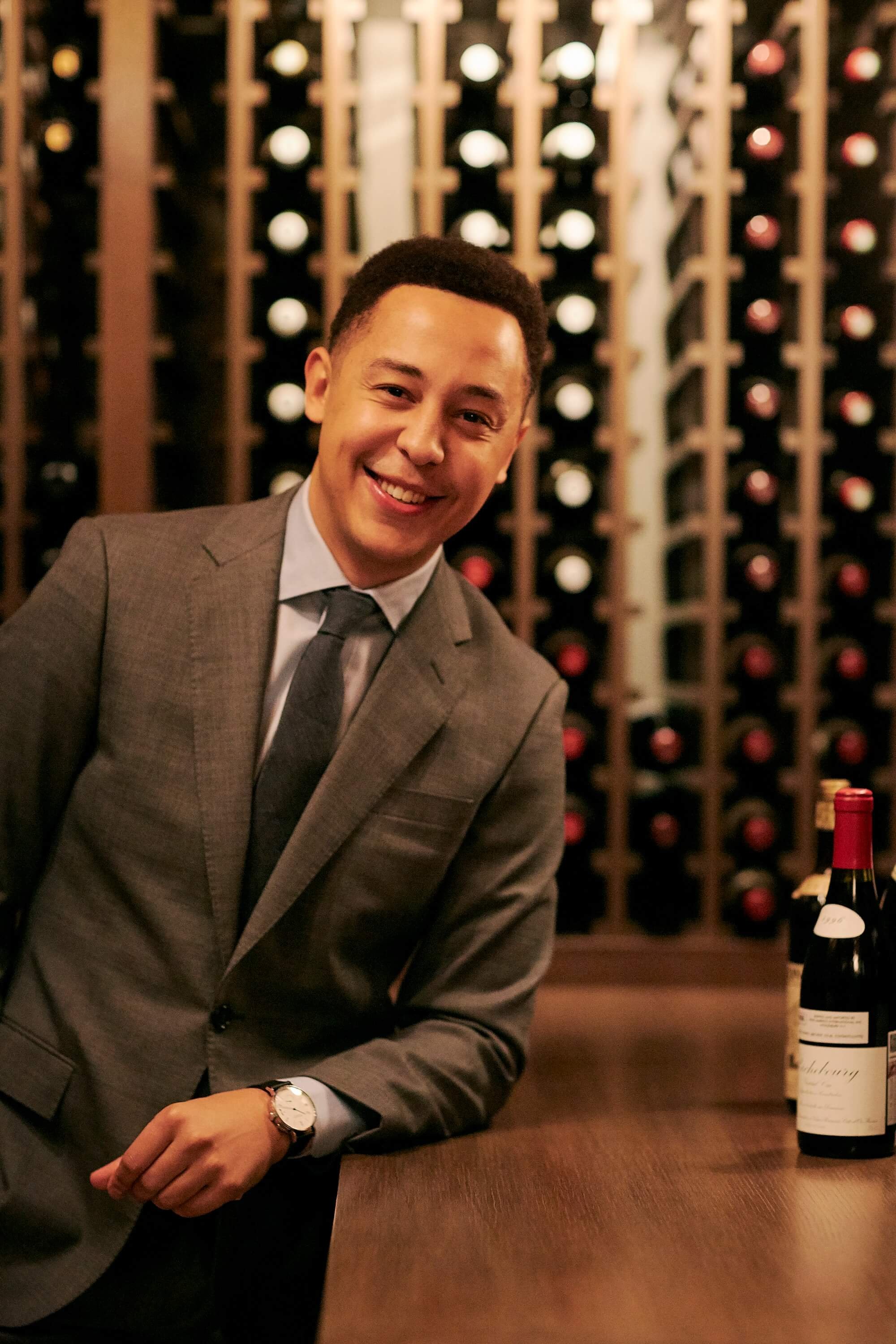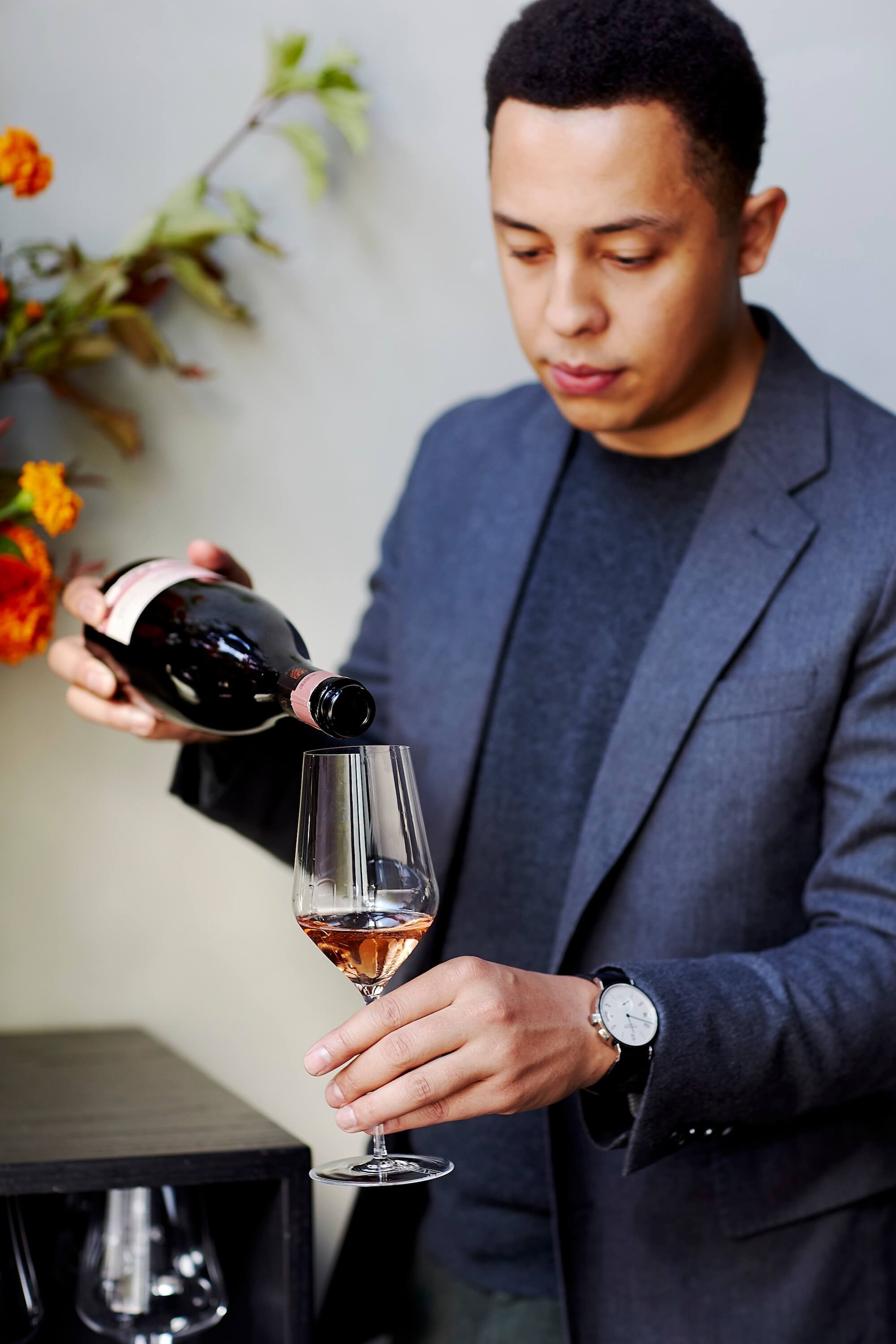What Does a Wine Consultant Do? Thatcher Baker-Briggs Seeks Excellence in Imports
Thatcher Baker-Briggs with bottle photo credit Thatchers Wine Consulting
It would be natural to assume that a love of drinking wine inspired a young chef to become a sommelier. Not so, for Thatcher Baker-Briggs, the founder of Thatcher’s Wine Consulting (TWC). He started his journey toward becoming a wine prodigy when he was barely old enough to drink. “Ironically, at the time, I didn’t even really enjoy drinking wine. I didn’t like the way it made me feel after drinking. But I loved the story, the history, the viticulture, and everything about it,” Baker-Briggs says.
The head of the consulting firm based in the United States, Switzerland, and Asia advises and procures wines for an impressive list of collectors and clients. Baker-Briggs began the journey to becoming a wine expert when he was just 20 years old, and for him, it has always been about the joy of discovery. “When you understand a little bit better where the wine comes from or at least when you understand the grape or winemaker, it adds so much excitement to the bottle,” says the San Francisco resident.
Tasting the Best
The certified sommelier began acquiring his extensive knowledge of wine and winemakers by spending countless hours reading and researching while helping a friend renovate a restaurant in Ontario. Baker-Briggs grew up in Windsor. “On my days off, I just read and read and read. I spent all of my money going to the wine shop and buying every kind of wine in bottles. I was never this sort of flashcard person. I like to understand things rather than just memorize them,” he says.
By age 22, Baker-Briggs had earned his certification from the Court of Master Sommeliers. He then pursued the right jobs so he could learn more about the world’s finest wines by tasting them. His work at elite restaurants prepared him to become a world leader on serving and acquiring the finest wines. He explains how he benefited from key positions at Michelin-starred Coi and Saison in San Francisco and Takazawa in Tokyo. “If you don’t drink the wines, you’ll never gain any insight on vintage, producer or vineyards. My time at Saison was very impactful. I was there four years, and we were striving for our third Michelin star. I learned a lot about people and hospitality there.”
The 30-year-old wine consultant sampled much-sought-after wines during his two years as the head sommelier at Takazawa. He developed invaluable insights, opinions and perspectives on wines not many people get to drink. A bottle he tasted in 2016 impressed him the most. “It’s the greatest white wine I’ve ever had. It was a 1969 Vogue Musigny Blanc. It was absolutely riveting. Nothing that I have ever had since even comes close. I will always remember it. That wine was magical,” says Baker-Briggs. “I spent five years looking for this wine and finally found one bottle. I have one bottle stashed away for a special birthday or special occasion. I hope it is good.”
Thatcher Baker-Briggs profile photo credit Thatchers Wine Consulting
Cultivating Consulting Services
The expertise TWC’s founder developed in his work as a sommelier elevated his reputation and relationships. One of the most critical lessons Baker-Briggs learned before launching his consulting company in 2019 was the value of honesty. “I realized that if you are honest with people and genuine, especially as a wine consultant, it can really take you places. That is a lesson I learned early on,” he says.
Today, Baker-Briggs travels extensively to cultivate relationships with collectors, wine producers and importers. His clients include leaders in technology, finance, politics and sports who often spend thousands of dollars on rare wines. TWC’s consulting services involve meticulous research that can help locate an elusive bottle, build a world-class cellar or plan wine services for a special event. “We work off of an annual retainer, so you certainly spend a somewhat significant amount of money on an annual basis to see the value in it,” says Baker-Briggs. “We have nothing to hide from anybody, though, where we get our wines, the pricing or anything like that. I think people really appreciate that.”
While TWC’s founder hunts for new acquisitions mainly in Burgundy, Champagne, Bordeaux, northern Rhône and Germany, three other experts handle the firm’s day-to-day operations. The team includes Director of Sales & Logistics Noah Dranow, Director of Private Clients Courtney Wieland and Cellar Master Daniel Estrada. Together, they are broadening the company’s reach with The Wine Cellar online option launched in June. “Anybody can go onto the website and buy anything that they want from our inventory. You don’t have to retain us on an annual basis to have curated access to the wine,” Baker-Briggs says.
He also promises that any wine procured for the TWC Cellar will be from trusted sources. “If I don’t like the wine, if I don’t drink the wine, if I don’t like the producer, it’s not on the website. I only buy things that I love. I feel we are a little different from some retailers. I’m not buying wine for the masses. I’m buying wines that I truly love.”
Curated selections are available through monthly subscriptions to TWC Cellar Access. For $98, subscribers receive three bottles of wine each month. The $150 subscriber gets three to four bottles that are much-talked-about and the favorites of wine experts and winemakers.
Thatcher Baker-Briggs Wine Bottles photo credit Thatchers Wine Consulting
Importing from Prodigy Producers
One of the characteristics Baker-Briggs shares with his super-achiever clients and wine-producing friends is passion. He was only 13 when his restaurant career kicked off with a dishwasher’s job in Windsor. Ten years of climbing the ranks in fine-dining restaurants followed as the Ontario native pursued his love of cooking. The chef-turned sommelier now enjoys promoting the achievements of young producers making incredible wines and embracing sustainable methods.
This year, he started importing wines to give clients access to the next generation of winemakers. “My goal is not to import wines and make them incredibly expensive. Inevitably that happens. My goal is to work with the young people concerned with global warming, who want to practice sustainable viticulture, look at things through their own lens and make wine their own way. For me, it is really inspiring if we can help them in their journey,” Baker-Briggs adds.
The first wines TWC’s founder imported to California were produced by Benjamin Benoit. The French winemaker was in his early 20s when he took over his family Domaine in Pupillin. Baker-Briggs describes how the purchase of Benoit’s Cellier Saint Benoit turned out. “His first vintage was 2019. We bought as much as we possibly could. People started to talk about them. We just got 2020, and the demand for them is going crazy. We had to limit how much we could sell to people because there’s just not enough wine to go around.”
Baker-Briggs finds emerging producers Francois Petit and Justine Boxler of Domaine La Rogerie equally exciting. He also admires New Zealander Tom Myers, whose wife is a member of the Rinaldi Italian winemaking family. “He has a wine called Cantina D’Arcy. It is not even in the bottle yet. They’ll be bottled in the spring. I tasted it through the barrel, and he’s really onto something.”
The shifting landscape of the wine industry gives TWC solid justification for pursuing new standouts in sustainable, eco-friendly winemaking. Baker-Briggs calls the current demand for quality wines astronomical. “COVID has changed the way people live their lives. Whether it is drinking at home or wanting to now have more parties with people, the industry has changed, and the demand for wine is unbelievable. If I looked at pre- pandemic pricing and pricing now, just in that year and a half period, they are like 300% more today. Almost everything, and also you can’t get the wine because the vintages are so small,” he says.
The sommelier points to the combined effects of COVID and global warming as culprits in decreased yields at many vineyards he visits overseas. One example of the impact on pricing is the vintage from Charles Lachaux. The winemaker is winning acclaim for what he produces in Burgundy at his family’s Domaine Arnoux-Lachaux, formerly named after Lachaux’s grandfather Robert Arnoux. “The 2017 vintage of Arnoux-Lachaux Vosne-Romanée Premier Cru Aux Reignots was released 9 months before the pandemic. I paid about $200 for that bottle, and 2019 will be $2,000.
Toasting with Taste
Baker-Briggs particularly enjoys sharing a champagne toast during the holidays or any time of the year. “I think there is nothing more exciting and fun than when you have a group of friends and family together, and you open a bottle of champagne. Every single person goes, ‘Wait a second. This is champagne? This is what it can taste like?’”
One of the wine consultant’s favorite champagnes is produced by Emmanuel Brochet. “He makes a very small amount of wines. He only makes about 1,600 bottles a year, which is not much for the whole world,” Baker-Briggs says.
Other wines he recommends for festive occasions or any day of the week include vintages from Adrien Dhondtand Alexandre Lamblot. However, no matter what label is on the bottle, Baker-Briggs recommends skipping the champagne flute. “I always recommend using a white wine glass, not a champagne flute or coupe, so you can get the full expression of the aromas and depth.”
Thatcher Baker-Briggs pouring wine photo credit Thatchers Wine Consulting
Next Step to Full Circle
The chef, sommelier and wine consultant envisions a future that will bring him full circle. He plans to celebrate a return to his first love, fine-dining. “I hope to open a restaurant one day where we can tie everything together. It can be a great home for all the imports, and we can have a great wine list and have clients come,” he says.
For now, Baker-Briggs focuses on importing wines from exceptional young producers and growing TWC’s portfolio. He offers this observation for anyone who wonders how a Black man from Canada reached such heights in the wine world. “No one should feel that they can’t do something in the wine industry because they’re Chinese, Black, Vietnamese or whatever. You can do whatever you want. People should always be given the opportunity, but it doesn’t mean it is going to be easy.”




